You feel pushed. Manipulated. Exploited. Dominated. Coerced. Pressured. Bullied. Controlled.
The person in front of you has gone too far and has overstepped your personal boundaries. But you don’t know what to do; you feel weak and helpless. A quiet desperation rises inside of you. You feel like a fly stuck in a web.
What can be done?

Soul Work Compass Course:
Drifting through life without direction is exhausting. If you feel paralyzed by confusion or self-doubt, this course is your map out of the fog. We guide you safely through your inner darkness to uncover your true needs, values, beliefs, wounds, and sacred gift. Turn your confusion into crystal-clear direction and find your True North today.
If you struggle with energy loss and issues such as over-commitment, lack of assertiveness, and feeling exhausted all the time by those around you, keep reading. It’s time to draw a clear line and reclaim your personal power.
Table of contents
- What are Personal Boundaries?
- Why Are Personal Boundaries So Important?
- Sensitivity, Absorbing Energy, and the Power of Purification Rituals
- 18 Signs You Have Poor Personal Boundaries
- 9 Signs Someone is Violating Your Boundaries
- Why Do We Suffer From Poor Personal Boundaries?
- 5 Myths About Personal Boundaries That People Believe
- Boundaries and the Spiritual Awakening Journey – Why They’re Crucial
- 12 Benefits of Creating Strong Personal Boundaries
- 9 Ways to Create Personal Boundaries That People Don’t Ignore
- Final Words
What are Personal Boundaries?

Personal boundaries are the mental, emotional, and physical walls we create to protect ourselves from being used, manipulated, drained, or violated by others.
These limits help us to clearly distinguish who we are and what we need from other people and their needs.
Creating and maintaining personal boundaries is essential to cultivating physical, emotional, and psychological well-being.
Why Are Personal Boundaries So Important?

Boundaries are an essential way of creating and upholding a healthy self-image. When a person has strong personal boundaries, it communicates to the world that they exude healthy self-respect and self-worth.
Most importantly, healthy boundaries help us to create a safe container within ourselves where self-compassion and mindfulness can blossom. Hence, creating boundaries makes us feel fundamentally good and preserves our personal integrity.
But without personal boundaries, we run the risk of confusing our needs and wants with others, which leads to codependency.
Want to get LonerWolf at the top of your Google search results?
Codependency is a term that describes a toxic one-sided relationship where we derive all of our happiness from others. The reality is that it’s impossible to enjoy a healthy relationship without strong and clear boundaries.
Without personal boundaries, there is also the risk of experiencing heightened stress and feelings of hopelessness.
Overcommitting to everyone and everything tends to take a serious toll on your mental health, which can eventually lead to burnout – or worse, a nervous breakdown.
Finally, a lack of personal boundaries can result in feelings of being worthless, weak, or not good enough. In other words, our self-esteem becomes severely impacted, and we may struggle with issues such as chronic self-doubt, self-judgment, and self-loathing.
Not being able to voice our truth and communicate our needs in a clear way can be deeply distressing and demoralizing.
Sensitivity, Absorbing Energy, and the Power of Purification Rituals

Developing clearly defined boundaries is crucial in all dimensions of life, including on the spiritual and energetic levels.
If you’re an empath or highly sensitive person like me (or someone who deals with people’s issues directly, like a healer or therapist), it’s always a wise idea to ground and clear your energy field each day as a form of boundary-setting.
We walk through life picking up so much mental, emotional, and energetic debris from the interactions we have with our environments.
Setting the ritual of purifying yourself on all levels can help you find more spiritual clarity, calmness, and groundedness, especially if you’re gifted with high sensitivity.
Some purification ritual ideas include:
Would you like to save this?
Your information will never be shared.
- Taking a shower or bath and visualizing all the gunk of the day washing down the drain
- Walking barefoot on the earth and feeling the ground’s energy neutralizing your energy field
- Sitting in nature and engaging in some ecotherapy
- Deep and slow breathing from the bottom of your belly (via breathwork)
- Using incense or herbal smoke
- Self-applied reiki (I do this daily, as well as the first recommendation)
18 Signs You Have Poor Personal Boundaries

Pay attention to the following signs. How many can you relate to?
- You fail to speak up when you’re treated badly
- You give away too much of your time
- You agree with a person when you actually feel like disagreeing
- You say “yes” to a person when you want to say “no”
- You feel guilty for dedicating time to yourself
- You feel taken for granted by others
- You permit people to touch you when you feel uncomfortable or want them to stop
- You have toxic relationships (i.e., you’re always giving, and the other is always taking)
- You make too many grand sacrifices for others at your own expense
- You are passive-aggressive and might have manipulative tendencies (as a way of trying to regain your lost power)
- You constantly feel like the victim
- You feel like you have to “earn” respect by being nice
- You over-share details about your life with others
- You feel guilty when others aren’t happy (as if you’re solely responsible)
- You are what other people want/need you to be, and not who YOU need to be
- You’re out of touch with your needs
- You attract people who try to control or dominate you
- You have chronic fear about what others think of you
Pause to consider which one of these points caught your eye and tugged at your awareness most strongly. Then, take a moment to place a hand over your heart and send yourself some understanding and kindness.
Having poor boundaries is a frustrating and painful experience, and you’re certainly not alone in experiencing it.
9 Signs Someone is Violating Your Boundaries
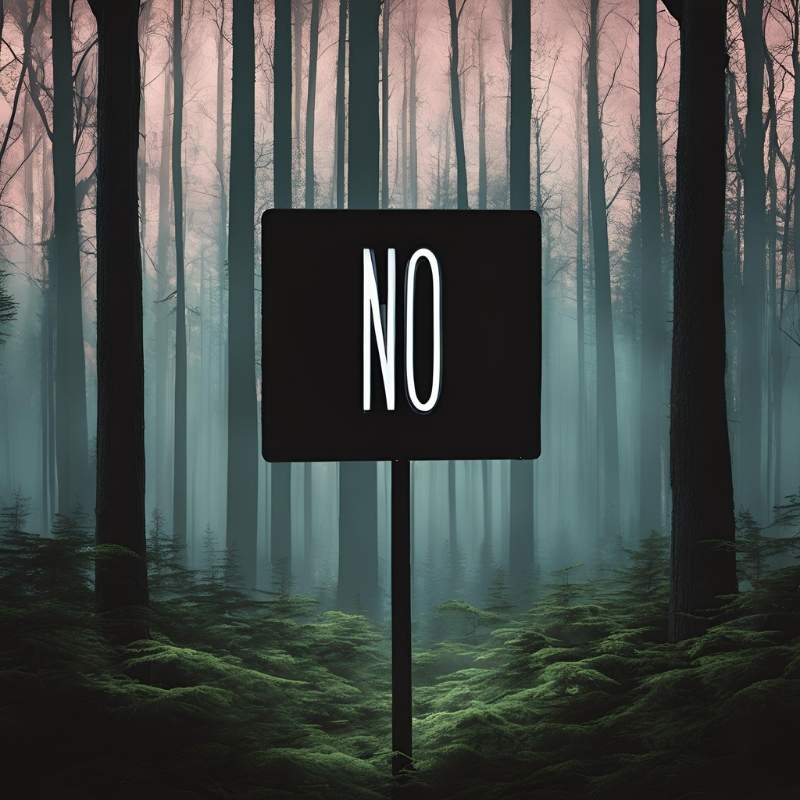
Pay attention to these red flags of having your personal boundaries violated:
- You feel the need to defend your boundaries (because the other person is resistant to you setting them for some reason).
- Your “no” isn’t being respected, and the person keeps doing the behavior that causes you to feel threatened or uncomfortable.
- Your personal space is being violated, and the person is touching you or standing too close to you in a way that makes you feel gross or unnerved.
- You aren’t being listened to, and you keep getting spoken over or ignored.
- You’re experiencing emotional abuse, and the other person mocks, denigrates, or manipulates you.
- You’re being pressured to act in a certain way or do something that you don’t want to do.
- You’re being controlled and coerced to play a certain role.
- You feel as though you can’t negotiate with the person because it’s ‘their way or the highway.’
- You feel disturbed, exhausted, or on-edge after being around the person for reasons you can’t quite pinpoint.
You’ll find that sometimes, some people unintentionally violate your boundaries (e.g., showing up unannounced at your house as a ‘surprise visit’).
Other times – like what I’ve experienced a lot due to life circumstances – you’ll deal with people who have a dark triad personality (narcissistic, machiavellian, or psychopathic personalities) who seem to get pleasure out of overstepping your boundaries as a way of ‘testing’ you.
Remember that you are a sovereign being, and your boundaries are sacred. They’re your protective bubble to keep, maintain, and assert at will.
Why Do We Suffer From Poor Personal Boundaries?

Before going too deeply into the understandable urge to blame or shame yourself in some way for having poor boundaries, I want you to understand that it wasn’t your fault, but it is your responsibility to develop strong boundaries now. So take a moment to feel some compassion, or at least sympathy, for yourself.
As children, we had no control over what our parents, teachers, and the adults around us taught us.
As a result, most people with absent or weak personal boundaries as adults struggle to feel confident enough to draw a line and adequately tend to their needs.
The codependent dynamics within our families, as well as being taught that “love equals what we do, not who we are,” contribute significantly to this lack of internal solidity.
As children, the first role models we had of “acceptable” behavior were our parents and family members. So pause to reflect here: what messages did your mother, father, caretakers, siblings, or other adults send to you growing up?
Were you only given love when you pretended to be who your parents or caretakers wanted you to be?
Were you only rewarded when you went out of the way to sacrifice your needs and desires in favor of someone else’s?
Were you punished for saying “no” or speaking up?
Did you feel obliged to emotionally “take care” of an adult, perhaps a parent?
These were all signs that you were taught that it was “good” to lack personal boundaries.
5 Myths About Personal Boundaries That People Believe
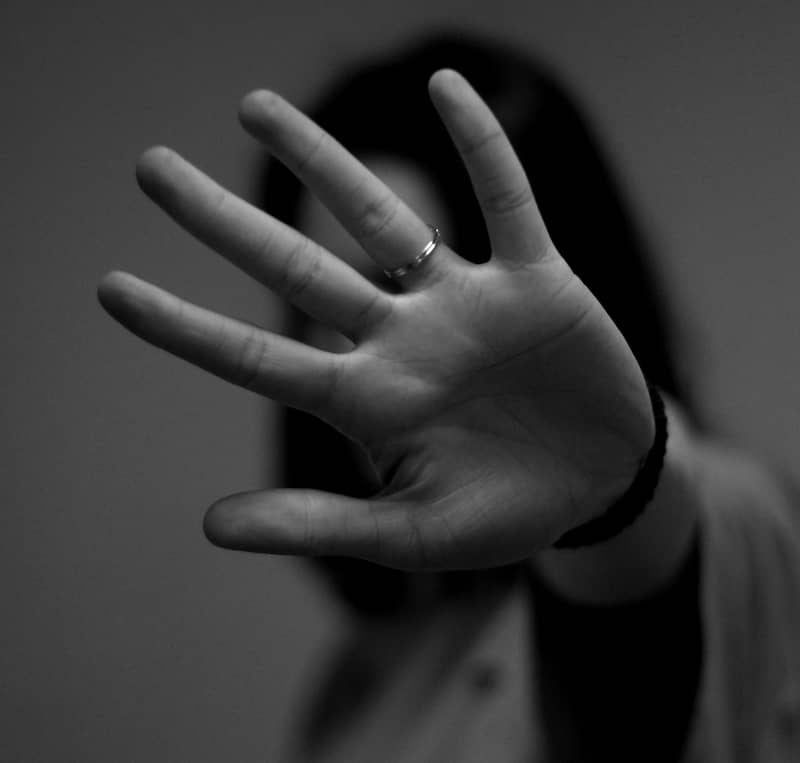
If you struggle with setting clear boundaries, you might carry a number of mistaken beliefs that you were conditioned to believe.
Here are some myths to be aware of:
- “Having personal boundaries is selfish.” – This myth is probably the most common one out there and it’s based on the unhealthy belief that in order to be worthy, we must be martyrs constantly self-sacrificing our needs. In reality, having boundaries is a form of self-respect that allows us to practice self-love, which can ripple out into the world and positively influence those around us. Take a moment to reflect on any good therapist or mental health professional. How do they do their job effectively? The answer is by having strong and clear personal boundaries. (Imagine taking on all the issues of those you serve – how exhausting and overwhelming!) The truth is that all mentally and emotionally healthy people possess clear boundaries.
- “Having personal boundaries will cause my relationships to suffer.” – If you are in a codependent relationship, creating boundaries will most certainly create uncomfortable waves of change. If your partner is codependently entangled with you, there’s a high chance that they will be shocked and will certainly resist your efforts to be happy and healthy. (The same thing goes for codependent friendships.) If you find yourself in this situation, I encourage you to consider whether being in a toxic relationship/friendship is actually worth it. All healthy and supportive relationships will actually THRIVE and encourage the establishment of personal boundaries.
- “Having personal boundaries will cause people to dislike me.” – This myth is partly true and partly false. The reality is that, yes, setting clear boundaries might step on a few people’s toes. But creating boundaries will also cause more people to respect, hear, and like you. There’s nothing more admirable than a person who refuses to take bullshit from others and who stands by what they believe to be true. Not only that, but when you set boundaries, you’ll actually attract more people who are willing to respect you and be authentic friends or lovers.
- “Having personal boundaries will make me miserable.” – This myth often appears as an underlying assumption that many people carry. But my response is simple: creating personal boundaries might feel uncomfortable at first, but pretty soon, it’ll make you feel empowered and in control of your life again. So the opposite here is true: having personal boundaries will actually make you MUCH happier!
- “Having personal boundaries sounds rigid.” – Personal boundaries are not black or white or set in stone – they are flexible according to your needs in the moment. So don’t feel the need to be harsh and cut people off. There’s a big difference between rigid boundaries and healthy boundaries. Rigid boundaries are walls constructed to permanently block people out, whereas healthy boundaries are adaptable and can change according to our inner needs.
Boundaries and the Spiritual Awakening Journey – Why They’re Crucial

Creating healthy personal boundaries doesn’t just benefit our everyday interactions with others, but it also enriches and strengthens our connection with our Souls.
When we’re constantly looking outside of ourselves and people-pleasing, we tend to forget that we all have a unique path in life, and it’s our job to listen to our true callings.
Lacking boundaries means that we’re frequently looking to others for direction and getting codependently enmeshed in their lives rather than focusing on our own.
Sometimes, what happens is that we get so wound up in other people that we “lose” ourselves. We experience a kind of soul loss (or being disconnected from our souls) that creates feelings of emptiness, loneliness, aimlessness, anxiety, and depression.
Lacking self-awareness of our true needs because we have poor boundaries, we may even fall into a Dark Night of the Soul where we feel totally lost and disconnected from our Higher Power (whatever that personally looks like).
Creating boundaries is an essential part of the spiritual awakening journey because it supports us in being true to ourselves, embracing our inner lone wolf, and walking our own paths.
12 Benefits of Creating Strong Personal Boundaries

Here are some benefits that you can expect from putting in the hard work of setting clear boundaries:
- You’ll be able to say “no”
- You’ll feel empowered again
- You’ll feel more in control of your life
- You’ll attract healthy + supportive partners and friends
- You’ll have more mental, emotional, and physical energy
- You’ll be able to speak up and be heard
- You’ll feel more appreciated and valued
- You’ll be more in touch with your needs
- You’ll spend more time on yourself (without the guilt)
- You’ll experience more emotional balance and happiness
- You’ll experience increased self-esteem and self-worth
- You’ll feel more courage and freedom to be yourself
Remember that these qualities won’t develop overnight, but with practice and persistence, you’ll be able to experience many of these empowering benefits.
9 Ways to Create Personal Boundaries That People Don’t Ignore
Creating boundaries is less about other people and more about you and the beliefs and mindsets you have.
The following practices and pieces of advice will help you target both your core beliefs and habitual behaviors.
1. Understand that you have the right to have boundaries
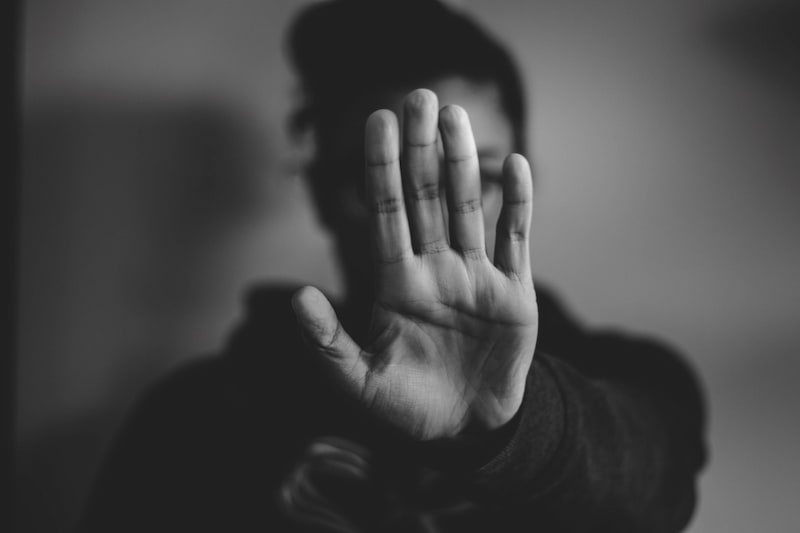
Lurking underneath the surface of people-pleasing behavior is the belief that we “have no right” to set boundaries. It’s time to challenge this ingrained assumption.
Why are others allowed to have boundaries and not you? Why must you feel like a lesser human being and elevate others above yourself?
It is a fundamental right of all human beings to have personal boundaries. Consider it your birthright to establish boundaries that define and protect you. Not only is it your right to create boundaries, but it is also your responsibility.
2. Understand that your thoughts, feelings, and needs are equally important to others

No one’s thoughts, feelings, or needs are “above” anyone else’s. Social status is an illusion created by the human mind.
In other words, the Queen of England’s needs are equal to a homeless person’s needs. The only division created between us and others exists in the mind. Therefore, you are not “less important,” valuable, or worthy than others. Your needs are equally important to those in your life.
Learn to see yourself as equal to others. Affirm your worth each and every day with a mantra such as “I am worthy and my needs are important.” Learn to disagree with those who try to make you think or feel otherwise.
3. Explore your needs
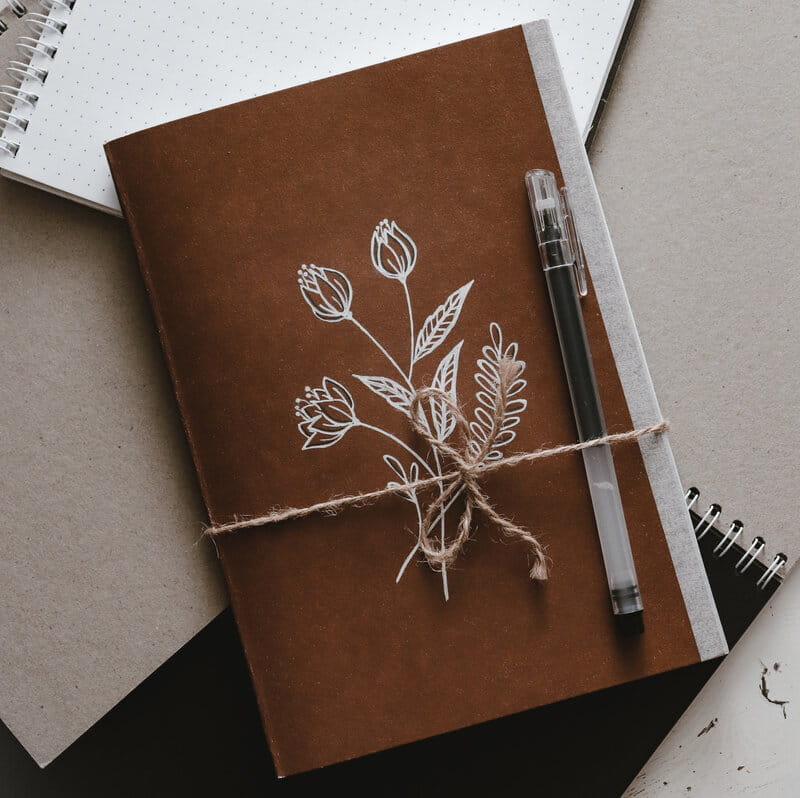
Chances are that you don’t have much experience or knowledge of your true needs, especially if you ignore them to cater to others’ demands. Now is the time to start learning more about yourself.
Keep a daily journal in which you record your thoughts, feelings, needs, and desires. Practicing self-reflection and introspection will help you to become more in tune with what you really need at any given moment. (Here are some journaling ideas.)
Practicing a few simple mindfulness exercises is another powerful way to know what boundaries you need to set during the day.
Dedicate yourself to tuning into and learning more about who you are and what you really want out of life. This is one of the best ways to begin setting personal boundaries.
A fun way to start learning about who you are is by taking self-discovery tests (take a look at our many insightful tests!).
4. Practice daily self-care (because you’re worth it!)

Practicing daily self-care is a supplementary practice that will bolster your ability to set clear personal boundaries.
When you get into the habit of nurturing yourself, you’re already setting yourself up for success. You’re sending yourself the message that “I’m worth taking care of.” Setting firm boundaries will then seem like the next natural step in your self-care routine.
Simple ways to perform self-care include taking time to relax, practicing meditation, making delicious and nutritious food for yourself, exercising, setting daily goals, complimenting yourself, rewarding yourself, taking a nap, connecting with nature, drinking a soothing cup of tea, and many other practices.
Check out this article on self-love for more suggestions.
5. Learn to say “no”
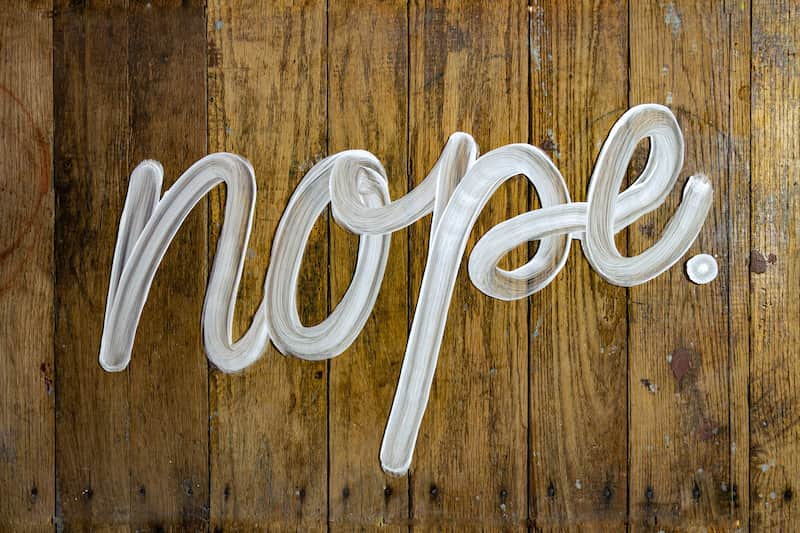
Saying no is a key part of learning to be assertive and honoring your needs. You don’t need to flat out or aggressively say “no” if the situation doesn’t call for it.
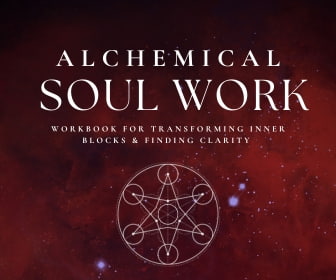
Feeling Lost?
The Alchemical Soul Work Workbook provides you with a clear path to clarity through the seven ancient stages of alchemy. With 50+ journaling prompts, you'll dissolve old patterns and forge a stronger connection with your Soul.
Instead, you can try saying phrases such as “No thank you,” “I can’t,” “I’m not able to,” “Not now,” “I’m busy, sorry,” “Maybe next time,” “I appreciate the offer, but I’m unable to,” and so forth.
Experiment with different ways of saying no and see what feels most resonant with your personality.
6. Identify when people cross the line (aka., “difficult people”)

It’s not always easy to identify when others overstep your boundaries, particularly if you’re used to not having any. However, there are some types of people (let’s call them “difficult people”) who quite blatantly cross the line.
Take time to record in a private journal each day all of the moments when you felt uncomfortable, upset, or disrespected by someone during the day. This journaling exercise will help you to develop more self-awareness.
Another way to know when people have overstepped your boundaries is by tuning into your body. Try to notice when you feel sensations like butterflies in your stomach, tension in your shoulders, or an increase in blood pressure, which will manifest as feeling flustered and hot.
Use these sensations as triggers to help you tune into the present moment and practice boundary setting.
To set boundaries with difficult people such as narcissistic, histrionic, and other egomaniac types:
- Create a list (on your phone, in your journal, etc.) of ways to say “no” that don’t stir up drama and preserve your energy (see the previous point on this list)
- Try to create as much physical, mental, and emotional distance from them as possible whenever you can
- Don’t get invested in their chaos – remember that they are responsible for themselves and their own well-being
- If you’re stuck dealing with such a person, try the “grey rock” method of self-protection where you become as bland and neutral as possible so as to stay grounded and calm
7. Stop overcommitting

You’re not obliged or indebted to uphold every single social commitment that you have. Don’t try to please others at your own expense. Committing too much to other people and circumstances creates stress and burnout.
Learning to say no to non-essential things like work get-togethers, parties, and other social duties that are not life-or-death takes practice.
So be gentle with yourself, remind yourself why you’re on this journey in the first place, and graciously decline whatever “fills your cup” too much. At the very least, others will appreciate your honesty.
8. Be courageous: let go of toxic friendships and relationships

It takes a certain level of courage to stick to your personal boundaries. Fake friends and flimsy relationships will inevitably self-destruct and fizzle away during this process. As a result, you might be left with feelings of guilt, shame, or feel like you’re doing something wrong.
It’s vital in these tough times to keep affirming that setting personal boundaries is your fundamental human right. You are WORTH it.
Those who try to control, use, or abuse you will likely try to stop you – but don’t let them hold you back. Step away from those people who are polluting your life and seek out new friendships that are supportive and uplifting.
9. Seek help (but not from friends or family)

If you still need help setting strong personal boundaries, chances are that those around you probably reinforce codependent behavior. So it’s not a wise idea to seek advice from them, however well-intentioned they may be.
If you need more in-depth advice and personal assistance, I recommend either reading a book such as Boundaries: When to Say Yes, How to Say No by Henry Cloud and John Townsend, or seeking the help of a therapist (or both).
I also recommend checking out the Sacred Boundaries Journal I’ve created to help you set clear, empowered personal boundaries.
If you’re a sensitive soul who doesn’t know how to say ‘no’ effectively, this journal can help you tune into your inner needs, access increased energy, and find more balance and self-sovereignty in life.
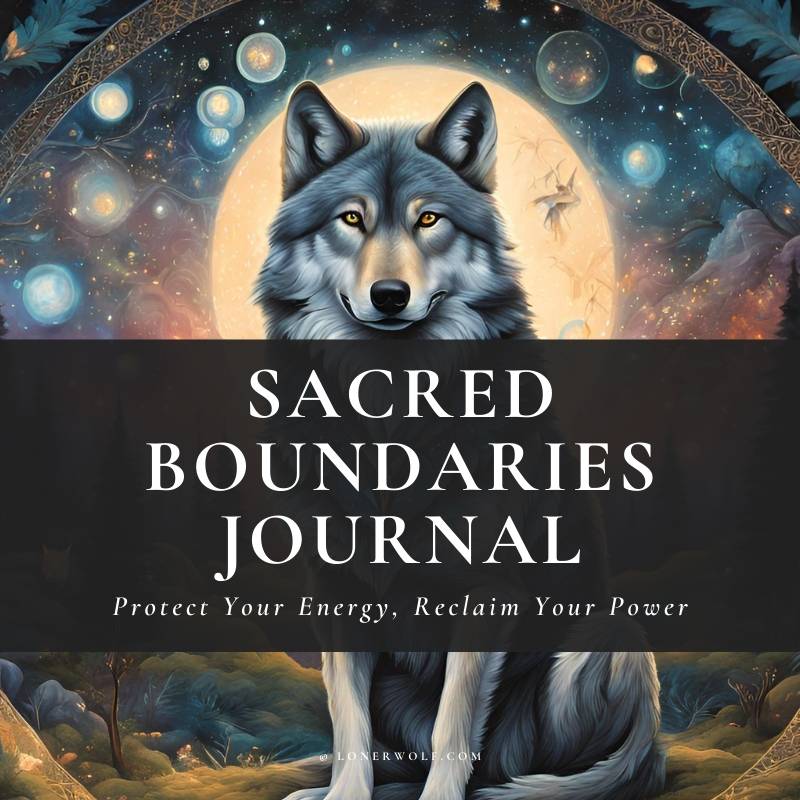
It features:
- 100% editable & printable format
- 30+ journaling prompts exploring the physical, mental, emotional, and spiritual dimensions of setting boundaries
- Lush images with quotes
- Healing mantras
- Oracle/tarot card spreads
- Book recommendations
You can download it as a bonus in our yearly LonerWolf Supporter Membership tier, where you get this journal plus a whole month of intuitive guidance and personal spiritual support.
This journal was a joy to create, and may it serve you well!
Final Words
To end, I want to remind you to be mindful of approaching this journey with gentleness and self-compassion.
You weren’t responsible for developing poor boundaries (it was how you were conditioned). However, you are responsible for now changing them and owning your personal power. I hope this article has given you some helpful pointers to help you do that.
Tell me, what experiences have you had with people overstepping your boundaries? And what advice can you give to others in your situation? I’d love to hear from you in the comments!
If you need more help, we offer 2 powerful ways to guide you on your inner journey:
1. The Soul Work Compass Course: Break free from feeling lost and disconnected. The Soul Work Compass is a practical 12-step course that transforms soul loss into soul clarity. Discover your core values, heal core wounds, and create a personalized compass to guide every decision you make.
2. The Inner Work Journal Bundle: Heal at the root. This Inner Work Journal Bundle guides you through self-love, inner child healing, and shadow integration with 150+ prompts and activities. You get editable digital files to use on any device or print unlimited times. Not for lukewarm seekers, these journals are for those ready to transform.
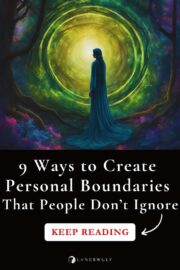
 $3
$3
Boundaries are hard. A lot of people tell me how to live my life. I don’t mind a crossing such as someone touching me once if it’s a friendly one, it’s hard but I’ll try to tell them if they do it again. But ones where people really try it are tough. Sometimes I have to cut ties, confront them or send formal complaints. And sometimes it means I have to be brave enough to butt heads with them.
I hope I can improve at boundaries with time.
Developing the courage to be disliked is something I struggle with as well — in fact, I’d say it’s universally a problem among all humans because we’re wired that way for survival. You’re definitely not alone in this struggle, Lala. Thanks for your vulnerability 💜
I believe I have strong boundaries. I easily say no to what I know is not right. I do not encourage people to tramp on me. Nevertheless, my “innocent” kids are always playing on my nerves and the only partners I attracted, with an exception of the only one who died, were people who just innocently or not so innocently ignored my needs and demanded me to meet theirs. There’s a tricky thing with boundaries, they are like double edged sword, high IQ and a life long journey in introspection is not enough to set them right. From the 17 signs of poor boundaries above I only have 2 or 3, but I could benefit from whole half of items on the list of advantages I could gain by having better boundaries, and I very much like to gain those benefits!
Thanks for sharing Larisa. :)
Having a high IQ and a lifelong journey of introspection doesn’t necessarily equate to developing strong boundaries. This is a skill you practice every day – and there are also three types of boundaries: rigid (unhealthy), weak (unhealthy), and balanced (healthy). I hope some of the advice in this article helps and you can put it into practice 💜
In your article on Shadow self, you stated how defenseless beings are targets for projection of our dark (negative) traits in our shadow self. Boundaries are the defenses you need to protect yourself from being a target for this projection.
Boundaries don’t necessarily protect you from being a target, as people will project onto you regardless of whether you have strong boundaries or not. Sometimes the stronger your boundaries are, the more someone will project onto you (as in the case of those with difficult personalities like narcissistic folks). But boundaries do, however, help you to take care of yourself and your needs, and to draw the line with others in a healthy way.
I felt that I was not OK as a child and so I pretended to be who I thought would be loved and excepted. This is my persona or mask. I have lived my life with this pre-tense. I forgot that this is not who I am. My persona is what I thought needed to be protected and needed boundaries. Who I truly am does not need to be protected or have boundaries. I realize now I need to be 100% responsible for everything. All my love, Stephan
Hi Stephan. I think it’s beautiful that you’ve realized that you’re not your persona or mask and that you feel freer because of that realization.
The Self indeed needs no boundaries as it is boundless. But the self (small ‘s’) needs boundaries otherwise, it is prone to getting used and abused. Thinking that you need to be 100% responsible for everything is a recipe for insanity and pain. You can only be responsible for yourself, not others.
This is a great article, thank you.
I’m working on boundaries with my therapist, and recognize myself in some of the items of your list, when I was in the savior role of the persecutor/victim/savior triangle.
I appreciate you sharing that, Sophie 💜
Boundaries. Easy to say, easy to understand, definitely want them, but also not quite as easy to understand and where to draw them. I’ve been going through a very difficult time with my beloved son, with whom I thought I had a close relationship. A recent death in our family has rendered him incapable of supporting our grieving family, but in a disrespectful and rejecting kind of way. We are so unsure of how to handle this as parents, but he has NOT been there for his sister, who lost her husband or us as parents, who are helping our daughter put a new foundation together for herself and her three children. We are beside ourselves with grief and have no idea how to handle this additional stressor. We feel like we lost our son too. Any ideas?
Hi Tammy. I’m so sorry to hear that you’re going through such a tough and confusing time. As I’m not a grief professional, I can only give my own personal perspective. But I do know that everyone deals with grief in their own ways. Some people move closer, and some move away and isolate themselves to try and deal with the pain. The best thing to do might be just to give your son time and space to process his own feelings, letting him know that you’re there for him, while supporting your daughter in the meantime. I hope you all find the peace and healing you need ❤️
Hello Tammy Be,
I imagine that maybe your son feels like family take for granted that he should have been there for his sister, whereas he can’t, because death ang grief can’t be managed by him, for any reason that shouldn’t be questioned.
So maybe he feels a judgment upon him and berate himself, which add to his helplessness and culpability. This come to me because of the rejecting kinf of way you mentioned.
That could reveal that he feels angry and guilty and can’t speak about it because the loss of his sister is so hudge that it feels like there is no place for him to express his own feelings. Like if his own boudaries are unspeakable, because il could be qualified as selfish.
I speak from a memories of a loss i didn’t managed very well when I was young, so overwhelmed by the sadness of other people that I suppressed any of my own feeling…and became unable to interact with any of them. Deny, dissociation…Burn-out happens few month ago…
And I’m very sorry for your loss.
Please forgive my english, it’s not my native tongue.
I had a coworker that would walk up behind me and slide their hand over my shoulder. Took a few times of letting them know not to do that and it hasn’t happened since. Also my mom has always felt compelled to tell me what I need to fix or do differently. I have pushed back twice now this year alone and feel better for it both times.
Good on you Angi!
This was a very good post about how boundaries improve one’s life and wellbeing. I’ve barely started out on enforcing my boundaries but the impact of just saying no to hanging out with people who are not good for me and telling people I will talk to them another time or not folloe their advice has been enormous…my whole relationships have changed drastically (i have less drama in my life as i also give those who dont like me less power sometimes) I will internalise this article to one day master boundary making skills
Boundary setting is so juicy and empowering, isn’t it L? :)
Well done!
I had just started to re read this weeks topic on Personal Boundaries, and had just written down the words manipulated, exploited, dominated, coerced, pressured, bullied, controlled etc. When I felt the need to explore more slowly and re read the Shadow Self, which is fascinating in its own right as a force for both good and a destructive force if left unchecked and unfelt. (A real non fluffy approach).
So I discovered that some of us that are at different stages, tend to “project” or dump the Dark Side from the Shadow self on others, as this in our non self loving ignorance is how we were guided to see and react in this mysterious inner/outer world.
Then I read a “quiet desperation…” Which made me wonder of the frustration I feel when my dear one drops a clanger (opinion) which needs investigation. During the discussion frustration develops, as I learn of my non inclusion in some social event. I feel isolated, abandoned or left out. As if I am not important enough to be considered worthy of inclusion in the planning of these events. Which sets off a kind of rejection or non loving attitude from her to me. A selfishness applied without respect or inclusion to the social role I play in relationship.
I often feel persuaded to go along with the current opinion and point of view, or be told to butt out. If I challenge this point of view with self non acceptance, then I am viewed as the controlling dominator or violator of the peace, and the intruder wanting to always squash good things because that’s the way I am. Which of course is not what I wish to hear or to feel. As I have a past history of coming from a manipulative family background where judgement and criticism of others was a way to set your own social framework or balance. So often I drop my voltage and soften or weaken my own views and opinion to avoid arguments over who is right or wrong. Go for the positive and see a balanced view of the light in any situation and try to avoid being overtaken subsumed into something which is not within my personal boundaries of acceptance.
Conclusion
I agree with Sol and Luna that we need to clear lots from our Shadow Self, and thus doing so can more easily a accommodate the non acceptance of personal boundaries from others. To be clearer in thought and non reactive when others fail to accept my right to be different as on individual Spiritual person.
“some of us that are at different stages, tend to “project” or dump the Dark Side from the Shadow self on others” – absolutely, and I like how you draw connections with setting boundaries. Thank you for sharing your thoughts and insights as always John :)
I’ve commented three times with regard to this article on setting boundaries. Obviously, it’s been an ongoing battle in my life. It’s difficult to set healthy boundaries with our adult children, as my husband chooses to make me the bad mom and buries his head in the sand, especially with our son who’s battled addiction for 20 years. It’s ruined our marriage – although still together. He’s perfectly fine, as long as I’m the one with a target on my back and he’s not in the line of fire. 42 years! We’ve lived in separate parts of our large home for about two years, but are trying to reconcile. A house divided…..will never work!
I hope you find a resolution that feels true to you soon, Terri. Much love ♡